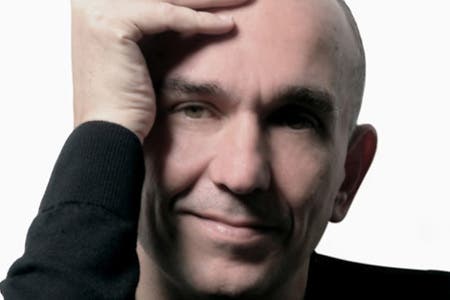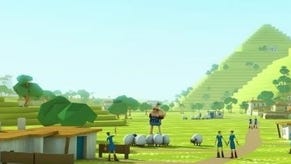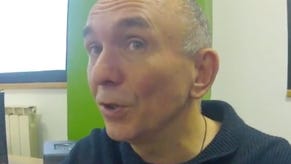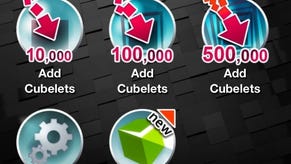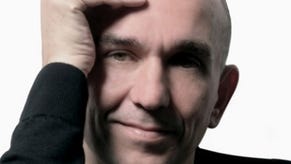Molyneux: $50,000 Curiosity DLC "nothing to be ashamed of"
"I don't expect for a second for the cube to make us any money."
Peter Molyneux has defended the eccentric pricing for the DLC for Curiosity, the forthcoming experimental app from his start-up company 22 Cans.
During a question and answer session at today's Rezzed show in Brighton, Molyneux was asked by a member of the audience whether the DLC - which includes one diamond pickaxe that's valued at $50,000 - was "sinister".
"Why is that not nice?" Molyneux retorted animatedly. "We can't be ashamed for asking people to spend money. We can't be ashamed of that. As a designer that is proof that I have done something meaningful. I'm not saying that you have to buy these chisels - and I don't expect the diamond chisel to ever be purchased. If it is I want to meet that person. They may be an investor or something!"
"I'm not doing this to purely monetize," Molyneux carried on, "but I don't mind monetization. I don't think it's anything to be ashamed of."
The incredibly expensive virtual chisel is part of a social media video game experiment that forms the basis of Molyneux's new main game, which he hopes will launch within the next two years.
Curiosity is set in a virtual room that contains a single black cube. As you tap away at it it fractures. Other fractures caused by other players can also be seen. After a large number of taps the cube opens, revealing its innards. Only the player who performs the final tap gets to see what's inside.
22 Cans will then record and study how news of what's inside spreads across social media in an attempt to explore the psychology of social media users.
But before the cube opens, players will be able to buy one of a limited number of chisels to improve their tapping strength. An iron chisel - 10 times more powerful than the default tap - costs 59 pence. The diamond chisel is 100,000 times as powerful - but it costs $50,000, and there is only one available.
Some have criticised the move, but Molyneux said he was trying to make free-to-play supported by monetization "feel like an investment for someone".
"If you turn round to someone and say, 'would you pay for this?', they're only going to pay for something if they really feel involved in that something. That's the whole point. It's all part of motivation.
"If someone is enjoying tapping so much then they should be able to upgrade their chisels. I don't mind that that. I don't expect for a second for the cube to make us any money. It's actually costing quite a lot to develop it because it's not just a cube, it's a real technology.
"But the reason I'm charging for the chisels is as a proof point on that motivation. Is the simplest form of motivation in the world - what's in the box? - sufficient to ask people to invest money in it? That's going to be a fascinating experiment.
"We may never sell a single chisel. But we have to experiment with free-to-play and how we're going to monetize the thing we're doing. We're not just doing it for free."
